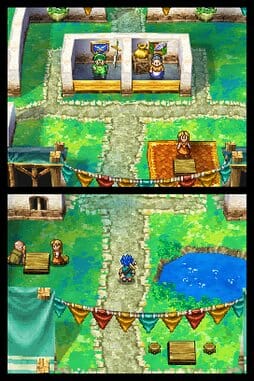Dragon Quest VI (DS)

Maybe I’ve taken my touch screen for granted.
Five years ago I would have scoffed at the thought. “Who needs to touch a game?” I might have asked. “That’s what controllers are for.” But after a passionate half-decade affair with Nintendo’s inimitable handheld, I’ve grown to love all of its terrible, wonderful, completely unnecessary gimmicks. And when Dragon Quest VI teases me with giant bottom-screen buttons and icons that beg to be touched but don’t react to my fingers, I can’t help but wish the game had kept up with the times.
That’s the thing about the sixth installment in the Dragon Quest series – it’s decidedly conservative. It’s filled with kings and orcs, demons and wizards. There’s a world to save, some levels to grind, plenty of slimes to kill. But outside of a few bonus mini-games, there’s no using the touch screen. Neither is there blowing into the microphone, or shaking around the DS like a slime-filled tambourine. Just good old-fashioned questing.
Of course, when it comes to good old-fashioned questing, Dragon Quest VI hits all of the right notes. The Dragon Quest series has always been known for getting the traditional RPG damn right, and DQVI does not buck that trend. The game presents all of the trappings—a silent protagonist, archetypical character classes, all sorts of unique dungeons and bosses—in a fresh coat of stylized 3D paint that never stops looking beautiful. Even the most minor of enemies are crafted with impressive detail, and the majority have appropriately groan-worthy names like “arrgoyle” and “corpsickle.”
The main storyline, which involves discovering the main character’s true identity and history while bouncing between two mirroring worlds, is interesting enough. But what’s really appealing is the world—players will find something entertaining to do in almost every hamlet and castle. In a given hour with the game, I could jump into a well to find an old lady’s ring, release a seafaring ship from its magical trappings, and pit brothers against one another in order to get the best price for my goods. The people of Dragon Quest VI speak in bizarre and often annoying accents—one town has more “you betcha”s than a Wisconsin dairy farm—but they tended to grow on me. It was a blast to bounce around from city to city and see what kind of problem I could help fix.